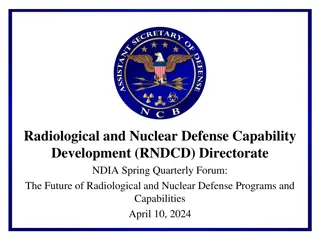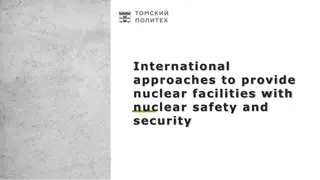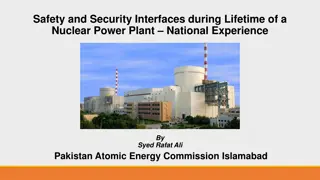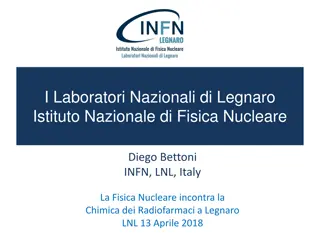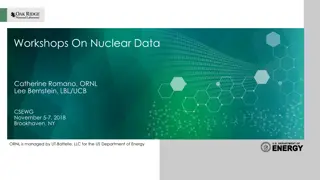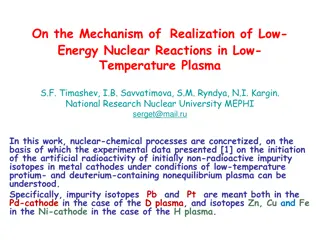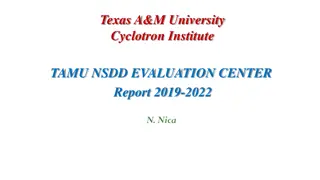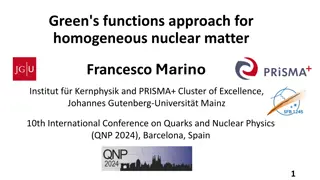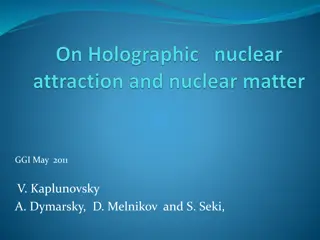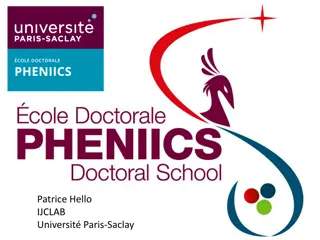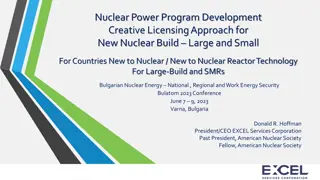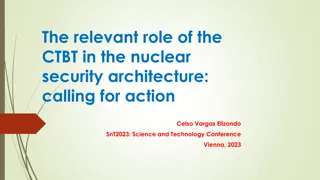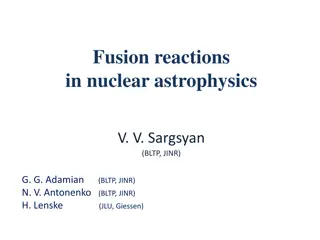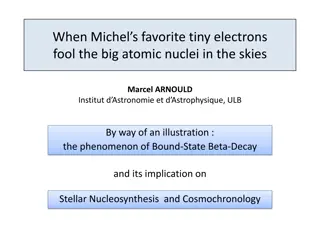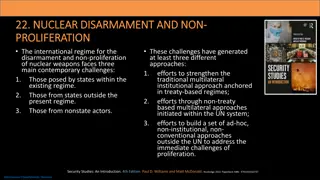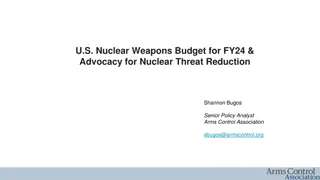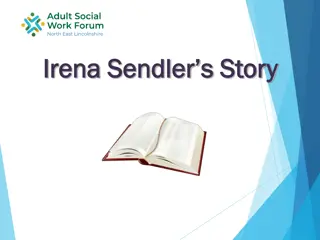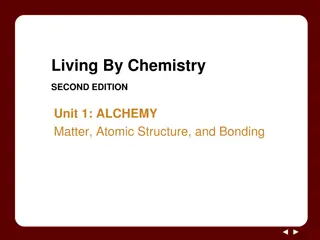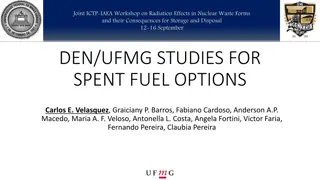IReNA: International Research Network for Nuclear Astrophysics
IReNA is an international network of networks focused on nuclear astrophysics, connecting researchers from various countries and institutions to enhance collaboration. Networks include Rare Isotope Accelerators, Gravitational Waves, Neutrino Physics, and more, aiming to advance research in the field.
Download Presentation

Please find below an Image/Link to download the presentation.
The content on the website is provided AS IS for your information and personal use only. It may not be sold, licensed, or shared on other websites without obtaining consent from the author. Download presentation by click this link. If you encounter any issues during the download, it is possible that the publisher has removed the file from their server.
E N D
Presentation Transcript
IReNA irenaweb.org IReNA International Research Network for Nuclear Astrophysics Zach Meisel Ohio University PIs: Hendrik Schatz (MSU), Tim Beers (UND), Sanjay Reddy (UW), Frank Timmes (ASU), Michael Wiescher (UND) Focus Area Coordinators: Achim Schwenk (TU Darmstadt, Germany), Alfredo Estrade (Central Michigan University, USA), Ana Becerril (Michigan State University, USA), Andreas Bauswein (GSI Darmstadt, Germany), Ani Aprahamian (University of Notre Dame, USA), Ann-Cecilie Larsen (University of Oslo, Norway), Anna Frebel (MIT, USA), Carla Fr hlich (North Carolina State University, USA), Carlos Allende Prieto (Canary Islands, Spain), Claudia Travaglio (INAF Torino, Italy), Falk Herwig (University of Victoria, Canada), Frank Timmes (Arizona State University, USA), Gabriel Martinez-Pinedo (TU Darmstadt, Germany), Gianluca Imbriani (Naples, Italy), Luke Roberts (Michigan State University, USA), Marco Pignatari (University of Hull, UK), Maria Lugaro (Konkoly Observatory Budapest, Hungary), Matt Mumpower (Los Alamos National Laboratory, USA), Michael Wiescher (Notre Dame, USA), Norbert Christlieb (Heidelberg, Germany), Remco Zegers (Michigan State University, USA) , Rene Reifarth (Frankfurt, Germany), Sanjay Reddy (University of Washington, USA), Shunji Nishimura (RIKEN Nishina Center, Japan), Timothy Beers (Notre Dame, USA), Toshio Suzuki (Nihon University, Japan), Wako Aoki (NAOJ, Japan), Zach Meisel (Ohio University, USA) IReNA NSF AccelNetNetwork of Networks
Networks are essential in research areas with a large diversity of subfields and capabilities that need to interact Rare Isotope Accelerators Heavy Ion Storage Rings Deep Underground Accelerators -ray Observatories Astero- seismology Virtual Galaxy Models Gravitational Waves X-ray Observatories Stable Beams Accelerators Stardust Analysis Large Scale Surveys Stellar Spectrosopy Dense Matter Nuclear Theory Multi-D Stellar Models Computing Professional Development Neutrino Physics IReNA addresses this need in the field of nuclear astrophysics IReNA NSF AccelNet Network of Networks
IReNA: International Research Network for Nuclear Astrophysics IReNA: an international network of networks, funded by the US National Science Foundation AccelNet program. Connects 34 countries via 6+3 networks to enhance international collaboration on research in nuclear astrophysics. Present networks: US: JINA-CEE [27 institutions] EU: ChETEC & ChETEC-INFRA [30 countries] Germany: SFB-881 [5 institutions] & EMMI [13 institutions] Canada: CaNPAN [6 institutions] UK: BRIDGECE [19 institutions] Japan: UKAKUREN [16 institutions] NuGRID: Virtual/International [21 institutions] IReNA NSF AccelNet Network of Networks
IReNA aims to promote international nuclear astrophysics research IReNA aims to promote collaboration via workshops and scientific exchanges. Support is available for members of a network in IReNA for: US persons traveling overseas Non-US persons traveling to the United States IReNA efforts are organized into 8 focus areas (FA): FA1: Nuclear Reaction Rates FA2: Stellar Abundances FA3: Dense Matter in Supernovae and Neutron Star Mergers FA4: R-Process Experiments FA5: Astrophysical Computer Models FA6: Nuclear Data for Astrophysics FA7: Weak Interactions FA8: Professional Development and Broadening Participation Each focus area has 3-5 coordinators, with US & international representation, including earlier and later career experts IReNA NSF AccelNet Network of Networks
IReNA activities include research stays, seminar series, Online workshops: 3 focused workshops summer 2021, + professional development workshop for young scientists at JINA Horizons Meeting December 2020 White paper on direct measurements for nuclear astrophysics reactions published in Journal of Physics G Virtual visitor program successful pilot: US-Italy on R-Matrix Theory Scientific exchanges connecting several institutions across IReNA Data exchange project initiated - enables international exchange of nuclear data for astrophysical applications Online seminar series with GatherTown coffee, organized by postdoc representatives from each network Young scientist organization formedwithin IReNA Fosters engagement of young scientists in international collaboration and networking and initiate professional development activities for young scientists Calendar project Women Scientists Who Made Nuclear Astrophysics started in ChETEC, IReNA framework greatly expanded impact by going beyond Europe to international footprint 2020-2021 Online Seminar Committee P. Gastis A. Psaltis M. Saxena N. Nishimura Z. Prudil IReNA NSF AccelNet Network of Networks C. Mondal Y. Lim
Highlights from Focus Area 1: Example of boot-strapping achievements Summer 2020 virtual workshop on stellar burning, (25 researchers from 23 institutions based in 9 countries) which led to a publishedwhitepaper on stellar burning that was featured by and led to a spin-off workshop on direct nuclear reaction measurements at underground laboratories, which will be the foundation for an evaluation of 13C( ,n) by the international community. Sponsored research stays in 2021: connecting Frankfurt to LANL to work toward realization of a neutron target connecting LUNA and JUNA to UND to improve stellar burning reaction rates IReNA NSF AccelNet Network of Networks
Highlights Network-Wide: Nuclear Astrophysics Whitepaper December 2020 virtual meeting, culminating in a field-wide white-paper (100 authors from around the globe) IReNA NSF AccelNet Network of Networks
IReNA has met challenges intrinsic to an international network-of-networks Intrinsic challenges: Communication across a large number of institutions with different cultures Integrating early-career researchers who do not already have many contacts Getting buy-in from network members when benefits are somewhat diffuse How to meet these challenges: Regular informal meetings of coordinators drives progress & builds relationships Early-career led seminar series and (satellite) workshops emphasizes strong participation. Committee representation gives an explicit say, as does Young Researchers Organization Community led goals and deliverables, e.g. workshops, whitepapers, scientific exchanges External challenges: The pandemic Securing local funding may be difficult for joint international projects How to meet these challenges: Leverage online format & be flexible Leverage funds where possible. Aim to fill gaps, e.g. travel support for visitors/exchanges IReNA NSF AccelNet Network of Networks
Summary: lessons learned thus far Networks are essential in research areas with a large diversity of subfields and capabilities that need to interact Growth of IReNA reflects the need for and benefits of this model Diversity of networks is a challenge and a strength Focus on supporting synergistic activities vs collaborative research Different approaches in each (formal informal, novel traditional, rigid-flexible) Challenges can be met with communication, flexibility, and a focus on community-led efforts Sharing experiences, successes, and best-practices between networks within a network and between networks of networks maximizes resources and boosts progress IReNA NSF AccelNet Network of Networks
IReNA: International Research Network for Nuclear Astrophysics Get involved by: Proposing IReNA workshop or scientific exchange: Calls for proposals will occur every ~3-6 months. For short-notice cases, contact a Focus Area coordinator. Support for ~week-month exchanges for focused workshops (or supplemental support for larger meetings). for students/postdocs is particularly encouraged. Attending an IReNA meeting: See the homepage for events: https://www.irenaweb.org/ Sign-up for the IReNA mailing list by joining the participant list: https://www.irenaweb.org/participate.html Visiting the IReNA website: www.irenaweb.org IReNA NSF AccelNet Network of Networks
Thanks Visit the IReNA website: www.irenaweb.org IReNA NSF AccelNet Network of Networks
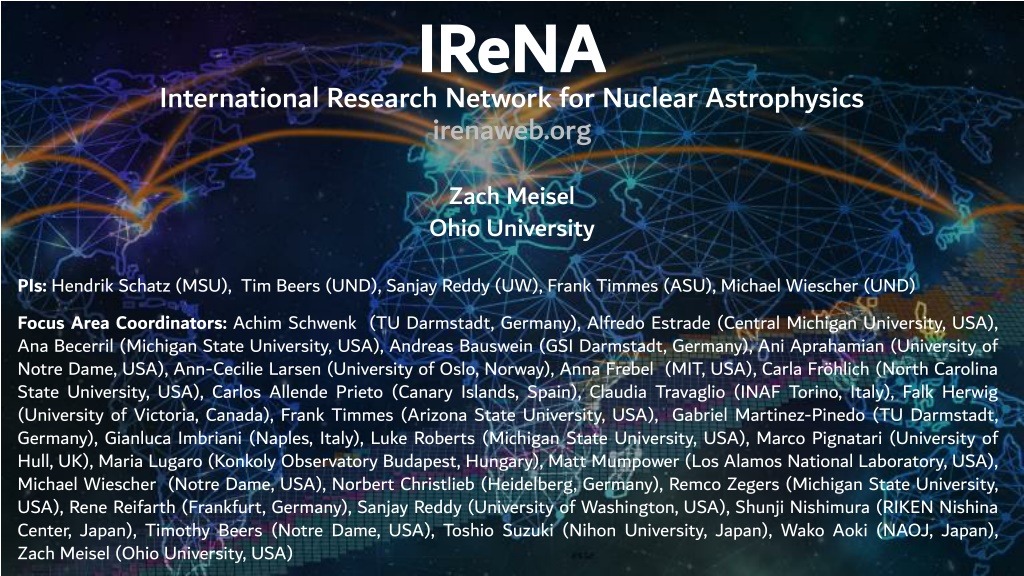

![[PDF⚡READ❤ONLINE] Black Hole Astrophysics: The Engine Paradigm (Springer Praxis](/thumb/21503/pdf-read-online-black-hole-astrophysics-the-engine-paradigm-springer-praxis.jpg)
![[PDF⚡READ❤ONLINE] Cosmology and Particle Astrophysics (Wiley-Praxis Series in As](/thumb/21627/pdf-read-online-cosmology-and-particle-astrophysics-wiley-praxis-series-in-as.jpg)

